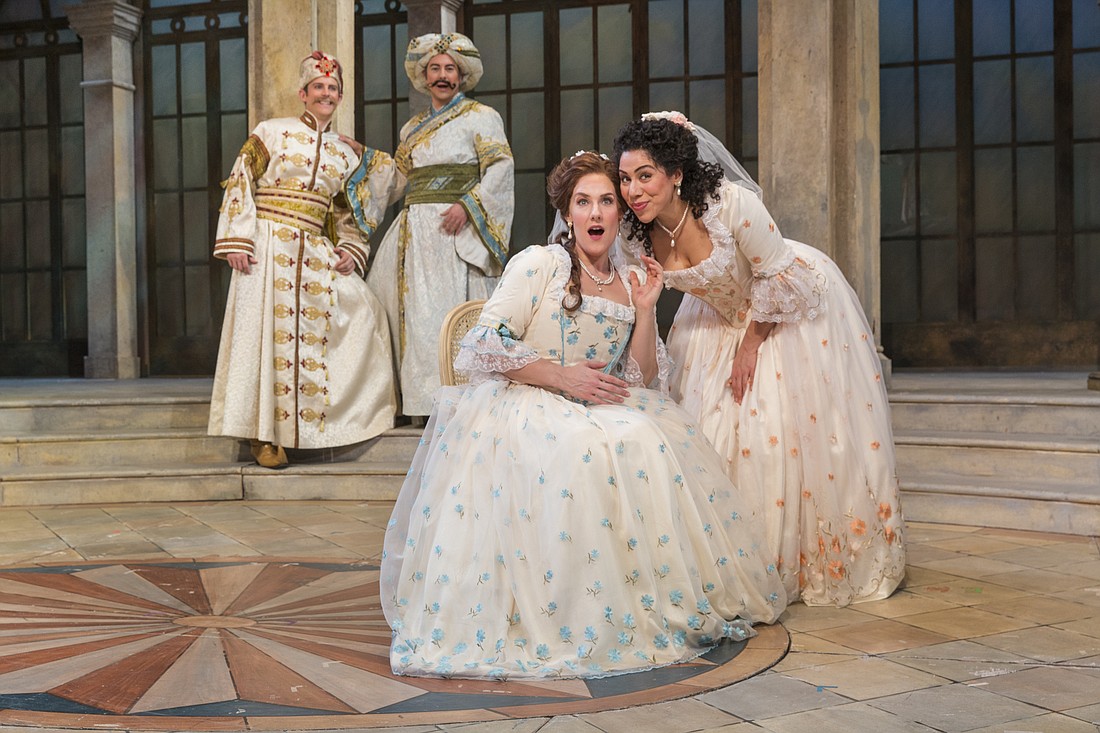- November 23, 2024
-
-
Loading

Loading

It’s hard to do a good translation of the title of Mozart’s opera, “Cosí fan tutte.” Literally, you might say it means, “So Do They All,” but unless you know the very convoluted story, you might not understand they’re talking about women. So do all women cheat, philander, flirt, lie and deceive. Sarasota Opera’s most recent addition to the Winter Season, calls it “The School for Lovers,” and that, at least, gives us a hint of what’s to come.
Silly and sexist though it may be, it’s still pretty funny when two guys, at the instigation of their friend and cohort, set out to discover just how faithful their fiancées really are. Disguises and a wily chambermaid lead to a fun but thought-provoking romp through the sexual values of yesteryear. And Mozart’s great arias, accentuated by his brilliant orchestration, give us a great operatic classic.
In one of the most stylish directorial debuts in a while, Kathleen Smith Belcher led the bemused but enlightened singers through some wonderful stage bits, turning the perplexing plot into a funny, clever staging that was insightful and smart. Lighting designer Ken Yunker gave us a subtle sense of time, with some beautiful back lighting. Howard Tsvi Kaplan’s costumes were gorgeous and in-character, keeping the two sisters in their favorite shades of pinks and blues throughout the comedy. And Scenic Designer David P. Gordon used an ingenious set that shifted from interior scenes to fragrant gardens before our eyes.
Conductor Marcello Cormio didn’t fare quite as well. The Sarasota Opera Orchestra was in fine voice, particularly the splendid winds, but Cormio seemed to miss the Mozartian nuances in the orchestration and had to work much harder than necessary to hold things together. Had he only followed Mozart’s road map of transitions, he’d have done better. Cormio almost lost control of his orchestra and singers, by holding notes too long or cutting phrases too short and not allowing for Mozart’s elegance to shine through.
This was a Cosí that belonged to one singer: the chambermaid, Despina. Angela Mortellaro was, by far, the most gifted of the performers, showing a bright, focused, sizeable lyric soprano that pretty much stole the show. She was funny without overdoing the comedy. And she was pert without being silly.
Jennifer Townshend, who has some attractive high notes and some good flexibility in her myriad runs, is really not a Fiordiligi. I’ve always felt Mozart must have been in a snit when he wrote for this character because he gave her two impossibly difficult arias that few sopranos can negotiate. Jumps of an octave and a half are common, leading sopranos into the nether lands of a basso at the bottom and near the stratosphere on the top. The result, unless the soprano is extraordinary, is at least three different voices coming from the same person. The goal is to make those registers sound like one but Townshend isn’t there yet. Her first act aria, “Come scoglio,” only pointed up her difficulty making register transitions. And her “Per Pietá, ben mio” in the second act was so careful she lost the inner anger that’s so necessary.
Heath Hubergmade a somewhat wimpy Ferrando, as a character and singer because his voice tends to be small and he sometimes strangles his high notes. His partner in crime, Guglielmo, portrayed by Corey Crider, came on stronger vocally and dramatically, although he tended to over-sing in some of his ensemble pieces, drowning out some of the smaller voices around him.
Shirin Eskandani made a charming Dorabella - - sassy, a little ditzy but always thoughtful - - with a rich, excellent mezzo and a good sense of blend with her colleagues. And Stefano de Peppo's Don Alfonso, the puppet master behind the plot to overthrow the lovers as they were and turn things topsy-turvy, was a solid basso-baritone-buffo, although some of his singing was a little rough around the edges.
This is a beautifully staged, fun-filled production, with many fine attributes. It also makes you think about relationships. Mozart’s genius pours out of every phrase and, although he threw in some of the most devilish music known for singers, he also turned the devil into a charmer through his incredible music.